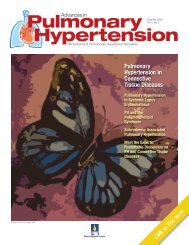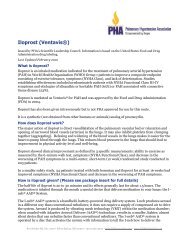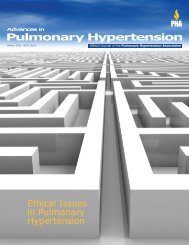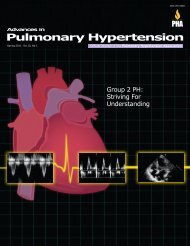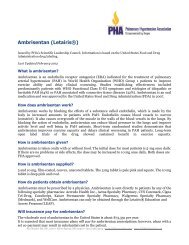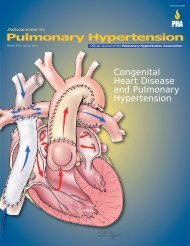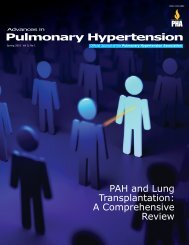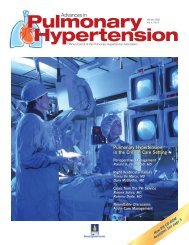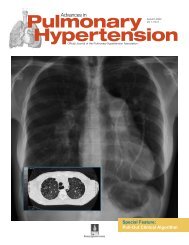Vol 7, No 3 - PHA Online University
Vol 7, No 3 - PHA Online University
Vol 7, No 3 - PHA Online University
Create successful ePaper yourself
Turn your PDF publications into a flip-book with our unique Google optimized e-Paper software.
the real cause of most morbidity and mortality in our patients is<br />
RV (dys)function. I thought Hunter did a great job of delivering the<br />
message while making it understandable and interesting to the<br />
general audience which included not only basic scientists but clinicians<br />
and patients as well.<br />
Dr Fagan: I also thought that the pharmacogenomics talk by<br />
Dr Weinshilboum was great. He was able to show how pharmacogenomics<br />
doesn’t just have the promise of impacting therapy in<br />
a wide range of diseases, he actually showed concrete examples<br />
of the role of this technology in patient care today. I don’t know<br />
how far into the future we are until we have this type of personalized<br />
medicine in PH, but it certainly raised the hope that maybe<br />
through pharmacogenomics we’ll understand a little bit more<br />
about which patients should be on which initial therapies and<br />
which patients may not respond even to combination treatments.<br />
I think that the hopefulness and the potential promise of this line<br />
of investigation is totally exciting.<br />
Dr Bull: I agree, and I think all of us tell the<br />
patient after we complete their evaluation, we<br />
will pick a therapy. A patient will ask, “Is this<br />
going to work?” And our answer is, “We’re<br />
going to have to wait and see.” And we can<br />
look at the odds and tell you what we think is<br />
going to happen. Of course at this juncture<br />
really honestly we don’t know. We’ve all had<br />
patients who have significant improvements<br />
with a phosphodiesterase inhibitor, for example,<br />
and others it does not seem to touch.<br />
There’s got to be something to that. We’re just<br />
not smart enough yet to know who will benefit<br />
from what drug up front. In the future,<br />
pharmacogemonics may give us some insight.<br />
It is my experience that when I consider therapy,<br />
especially oral therapy, that my recommendations<br />
are more based on toxicity then<br />
efficiacy, ie, this treatment potentially could cause this problem<br />
as opposed to this, may really help. Pharmacogenomics may help<br />
in both areas to identify persons with expected benefit as well as<br />
persons with higher likelihood of toxicity.<br />
Dr Minai: Karen and Todd, I completely agree. When we look at<br />
clinical trials of oral medications in PH, we find that several medications<br />
have very similar overall efficacy in a cluster of patients<br />
and we tend to focus on the mean or average response rate. However,<br />
within each study population there are patients who respond<br />
extremely well, ie, much better than average and those that don’t<br />
respond at all to the same medication. Currently, we lack a reliable<br />
method of identifying these subgroups with any degree of accuracy.<br />
The patient who responds poorly to one medication may<br />
respond very well to another medication. Pharmacogenomics holds<br />
the promise of helping us match the patient with the right drug up<br />
front. That would be a great benefit to physicians in choosing therapy<br />
and to patients in this rapidly progressing disease.<br />
Dr Fagan: To be able to sit in the clinic with a patient and to have<br />
on a piece of paper an assessment about what they’re most likely<br />
to respond to is a powerful thought. It might limit the “wait and<br />
see” period after starting a treatment to see if it has any effect. It<br />
also might limit the possibility of losing ground.<br />
“My current work is<br />
looking at gene expression<br />
profiling and<br />
peripheral bloodcells<br />
and people with PH.<br />
My hypothesis is that<br />
we can gain information about PH by<br />
looking at immune-related cells from<br />
the blood. Part of the difficulty has<br />
always been that the lung tissue,<br />
where PH is manifest, is not readily<br />
accessible in our patients. So we<br />
need to find surrogate tissue to<br />
examine. We’re looking at the blood<br />
cells as a surrogate marker of the<br />
disease and have had some success<br />
using this approach.” –Dr Bull<br />
Dr McMurtry: <strong>No</strong>t only was Dr Weinshilboum’s talk on pharmacogenomics<br />
up to date and educational; it was also very entertaining.<br />
He is a personable and skillful lecturer, and anyone who<br />
gets the chance to hear him speak should definitely do so.<br />
Dr Fagan: I also thought Dale Able’s lecture on metabolic determinants<br />
of a cardiac myocyte performance was really intriguing.<br />
His work has illuminated the mechanisms of cardiac dysfunction<br />
associated with the metabolic syndrome. I was really impressed<br />
with his ability to make the incredible complex metabolic signaling<br />
pathways approachable to clinicians and to people who are<br />
nonmetabolic researchers. It really reminded me that our patients<br />
have comorbidities that they’re bringing to the table as well. So it’s<br />
not just what their genes are, it’s not just whether they have scleroderma<br />
or whether they’ve got congenital heart disease, but they<br />
bring all sorts of other things to the table that can directly impact<br />
their overall heath and PH treatment. Obviously one of those are<br />
people who have metabolic syndrome related<br />
to obesity. There are several articles that are<br />
beginning to look more carefully at the effects<br />
of metabolism on cardiac performance.<br />
It certainly spurred me to think about RV<br />
performance in a different way.<br />
Dr Minai: Several studies have established<br />
a clear link between the metabolic syndrome<br />
and cardiovascular disease. Despite recent<br />
studies, this link remains tantalizingly close<br />
but as yet unproven in PH. Studies looking<br />
at the association between PH and obesity<br />
and sleep apnea have reported mixed results.<br />
This is an area that requires further<br />
study.<br />
Dr Bull: We tend to hone in on the pulmonary<br />
vascular bed and the RV response to<br />
pressure overload but our patients live in the<br />
real world and have all the diseases of the real world and how<br />
these things interact in a more sophisticated manner is important<br />
to consider. So I thought that was a great lecture as well.<br />
Dr Fagan: The meeting gave us a chance to also look at clinical<br />
and translational research opportunities. I know that you, Todd,<br />
participated in some research at these scientific sessions and I<br />
was hoping you could tell us how you did it, some of the difficulties<br />
in doing research away from your own primary site and what<br />
you thought about how the meeting contributes to your research.<br />
Dr Bull: This is actually my second time doing research at the<br />
<strong>PHA</strong> conference. In Minneapolis I was working on the same project.<br />
It is only possible through the generosity of <strong>PHA</strong> and most importantly,<br />
the patients who attend the <strong>PHA</strong> meeting. My current<br />
work is looking at gene expression profiling and peripheral blood<br />
cells and people with PH. My hypothesis is that we can gain information<br />
about PH by looking at immune-related cells from the<br />
blood. Part of the difficulty has always been that the lung tissue,<br />
where PH is manifest, is not readily accessible in our patients.<br />
So we need to find surrogate tissue to examine. We’re looking at<br />
the blood cells as a surrogate marker of the disease and have had<br />
some success using this approach. This success has been in large<br />
part due to the <strong>PHA</strong> conference research. Greg Elliot really started<br />
354 Advances in Pulmonary Hypertension



